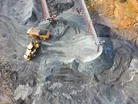Global commission launched to raise mining sustainability

The Global Investor Commission on Mining 2030 has just been launched at the London Stock Exchange to address the systemic risks faced by the mining sector that challenge its social license to operate and the role it needs to play in providing the minerals for the low carbon transition.
The Commission is backed by the Archbishop of Canterbury, Justin Welby, and the Archbishop of Cape Town, Dr Thabo Makgoba, as well as global investor network the Principles for Responsible Investment (PRI) and advised by the United Nations Environment Programme (UNEP).
The agenda
An ambitious agenda will be pursued by the Commission targeting sector-wide reform by 2030 to be supported by investors, banks, insurers and mineral demand side companies. Recognising the central role the mining industry must play in the transition to a low carbon economy and the vulnerability of supply chains to mineral demand, the Commission will carefully consider the Standards, practical steps and investment needed to secure mining’s future. A key focus of the work of the Commission will be to identify gaps in global best practice standards across social and environmental systemic risks including artisanal mining, waste management, biodiversity protection, child labour and the role minerals play in driving conflict.
The Commission will draw lessons learnt from the recent investor collaboration following the Brumadinho disaster in Brazil where a new Global Standard on Tailings Management was negotiated with industry and the UN, and a Global Institute announced to oversee independent auditing of individual mine site compliance with the Standard.
By 2050, the World Bank forecasts a 500% surge in demand for metals and minerals, such as lithium, nickel and graphite, used to produce the clean energy technologies needed to meet Paris Climate Agreement goals. As miners scale production to meet demand, they must do so responsibly and without harm to communities and the environment – or risk conflict and opposition from host communities that will in turn undermine the global climate transition.
Adam Matthews, Chair of the Global Investor Commission on Mining 2030 and Chief Responsible Investment Officer of the Church of England Pensions Board, said:
“To achieve net zero requires an expansion of mining. And yet, the industry will not be able to expand without managing inherent systemic risks from tailings dams prone to collapse, to the impact of automation on workforces, to the relationships with artisanal miners and where mining contributes to, or drives conflict. These are sector wide issues that require systemic responses if mining is to secure the trust of society to catalyse the flow of capital required for its expansion.
“Working practically, transparently and in partnership with industry and other stakeholders, the new Commission aims to bring the finance and corporate worlds together to ensure the mining industry retains its social license as it scales to meet demand for the low carbon transition.”



